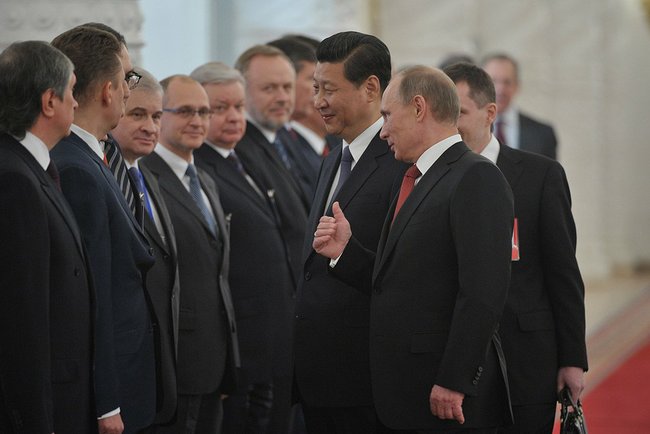
At the start of his historic visit to Russia last week newly-installed Chinese President Xi Jingping said that the “two countries spoke a common language.” If America sees itself as the indispensable global pivot China clearly has the ambition to become the other global pivot in a new bipolar order.
Xi’s visit to Moscow last week, just over forty years on from Henry Kissinger’s famous 1971 visit to Beijing, makes it is clear that China is embarked on a grand strategy to balance America on the world stage. This will be a tumultuous twenty-first century.
Kissinger’s 1971 visit to China was set against the backdrop of a Nixon administration desperate to extract itself from a failing Vietnam War. Kissinger, the grand architect of Cold War Realpolitik, wanted to force the Soviet Union to look both east and west. Moscow was already at the time embroiled in a full-scale border war with China, its supposed Communist partner. In a sense by forcing the Soviet Union to face the prospect of a ‘zweifrontenskrieg’ (two-front war) Kissinger applied lessons from his native Germany’s history to US grand strategy.
Cue Xi. The aim of Chinese grand strategy is certainly not to trigger a war with the Americans. However, Chinese strategic logic is still embedded in Sun Tzu; force an opponent to confront so many options over such time and distance that to all intents and purposes they render themselves weak by uncertainty. And, Xi clearly understands Kissinger’s dictum that “no country can act wisely in every part of the globe at every moment of time.”
Xi’s timing is impeccable. There are of course perfectly legitimate reasons for close Chinese-Russian relations. They are partners in the Shanghai Co-operation Organization. China is the world’s biggest energy consumer whilst Russia is the biggest energy provider. Trade between the two countries is booming and is now worth some $88bn or €68bn per annum.
However, Xi’s visit and indeed his vision is grand strategic and must be seen as such. China intends to lead the strategic counter-balance to the American not-so-well led West and to that end will forge relationships that exploit American uncertainty and Europe’s precipitous decline.
Kissinger famously said that “If you don’t know where you are going, every road will get you nowhere.” As Xi was speaking to Russian President Putin I was attending a conference in The Hague organized by the excellent Atlantic Commission on the transatlantic partnership. Set against Xi’s visit to Moscow the extent to which Europe’s political class has completely lost the strategic plot was all too evident. As Xi talked about a new anti-democracy global balance of power pact with Putin all my fellow Europeans could worry about was Cyprus and trying to blame America and Britain for causing the Eurozone crisis. Not only is that laughably wrong it completely and dangerously misses Xi’s point.
And there is a link. The Russian media has been running stories all week about the EU’s attempts to resolve the Cyprus crisis as being anti-Russian. Given that the deal struck over the weekend will possibly see a levy of up to 20 percent on depositor’s accounts worth €100,000 and more the deal will indeed have a real impact on Russian depositors. Now, much of that money is of very dubious provenance and it is clear that Germany in particular wants to stop Cyprus being used as an offshore bank haven within the Euro. However, the timing could not have been worse and will simply help push Russia towards a new anti-Western strategic partnership with China.
That dynamic will be made all the more certain by the strategic denial that now afflicts the Euro-world. For example, the Chinese are clearly building a blue-water navy and Xi’s comments demonstrate clear intent to use the Chinese fleet as a platform for strategic influence. Do not worry, I was told by a senior NATO official, because the Chinese do not know how to use such a fleet. Sorry NATO but should you not be thinking about these developments?
Clearly, the West must not fall into the trap of concluding that legitimate Chinese ambitions are a precursor to conflict and somehow a new narrative is needed in the US-Chinese strategic relationship (the only strategic relationship that now matters). Equally, neither Americans nor Europeans can ignore Chinese intent as stated by Xi in Moscow or its burgeoning capability. In others words the transatlantic allies need a China strategy.
Sadly that was not the worst of it in The Hague. A senior European said that in December the European Union will devote a WHOLE session of the European Council meeting to defense. Whoopee!
Kissinger said that “power is the great aphrodisiac.” Perhaps he should now add that weakness is the great sedative.
Xi’s Kissinger move – it will not be his last.
Julian Lindley-French is a member of the Atlantic Council’s Strategic Advisory Group. This essay first appeared on his personal blog, Lindley-French’s Blog Blast.
Photo credit: kremlin.ru
